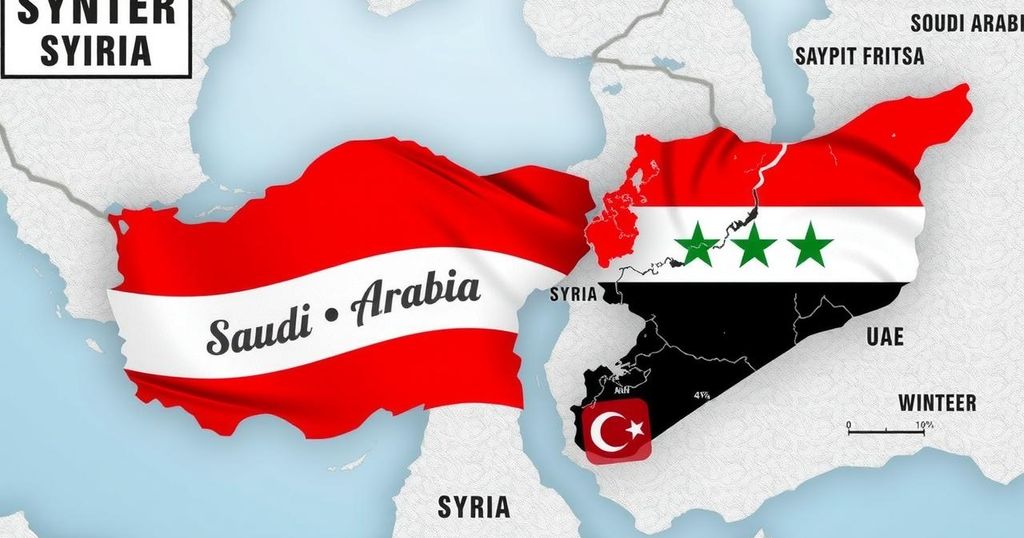Turkey is seeking support from Saudi Arabia and the UAE to stabilize Syria after Assad’s regime collapse, emphasizing collaboration to avoid past mistakes from the Arab Spring. The Turkish government aims for a neutral Syrian state that poses no threats to regional security, particularly to Israel and Iran, while engaging with global partners for reconstruction efforts amidst complex geopolitical dynamics, including Russia’s military presence.
Turkey is actively seeking the support of Saudi Arabia and the United Arab Emirates (UAE) to help stabilize post-Assad Syria, amid the regime’s dramatic collapse which occurred over a mere eleven days. Recognizing the lessons from previous turmoil during the Arab Spring, Turkish officials in Ankara are approaching their regional allies cautiously, aiming to avoid exacerbating ongoing chaos. President Recep Tayyip Erdogan is particularly focused on garnering long-term support from Gulf nations, which harbor reservations regarding organizations such as the Muslim Brotherhood.
In a significant diplomatic move, Erdogan is expected to meet with Egyptian President Abdel Fattah el-Sisi, where Syria’s future government will be a major topic. Both leaders share common apprehensions about the rise of Hay’at Tahrir al-Sham (HTS) in Syria, an entity Ankara has been cautious to acknowledge. Although Turkey has denied offering direct support to HTS, Turkish Foreign Minister Hakan Fidan acknowledged on national television, “No one knows this group better than Turkey,” implying Turkey’s considerable influence in the ongoing conflict.
Fidan has also engaged with various international stakeholders, including the United States and the European Union, during cooperative summits aimed at establishing a new inclusive governance framework in Syria. Notably, Ankara emphasizes the need for a neutral Syria that does not threaten regional stability, particularly regarding terrorism. Fidan stated, “We do not want Iranian domination in the region, nor do we want Turkish domination,” advocating for a cooperative regional order.
Turkey’s overtures have seemingly altered the rhetoric of Gulf leaders, who, after UAE engagement with the HTS-led administration, have shown willingness to invest in Syria’s economic future. Moreover, Turkey understands that the reconstruction of Syria will necessitate financial contributions from the Gulf states and Western powers. European Commission President Ursula von der Leyen has pledged increased support for the country’s recovery efforts, emphasizing the EU’s readiness to assist.
However, Russia’s military presence in Syria complicates these initiatives, as Moscow has supported Assad’s regime since 2015 and continues to negotiate with HTS regarding its future role in the region. Turkish officials remain optimistic that Russia and Iran will recognize the HTS-led government to foster stabilization efforts. The dynamics surrounding Syria remain complex, necessitating careful diplomacy from all involved parties.
Recent developments in Syria following the swift downfall of Bashar al-Assad’s regime have positioned Turkey as a significant influence on the country’s future governance. Awareness of the perils stemming from the Arab Spring has prompted Turkish officials to approach the situation with caution, seeking to cultivate alliances with regional powers, particularly the Gulf nations. The engagement with Saudi Arabia and the UAE reflects Turkey’s understanding of the need for collaborative efforts to rebuild a stable, non-threatening Syria, prioritizing regional security and stability.
In conclusion, Turkey’s pursuit of support from Saudi Arabia and the UAE reflects its strategic response to the shifting dynamics in Syria post-Assad. The need for a cooperative, neutral Syrian state is central to Ankara’s agenda, as emphasized by Hakan Fidan. Diplomatic efforts are geared toward ensuring that Syria does not project threats to its neighbors, particularly from sectarian influences. The successful stabilization and reconstruction of Syria are contingent on contributions from Gulf nations and collaborative international efforts, amidst the complex geopolitical interests at play.
Original Source: www.middleeasteye.net






